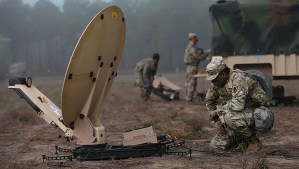WASHINGTON — The U. S. Army plans to launch later this year a new procurement of satellite communications terminals through the so-called Family of Terminals – Large (FoT-L) program.
The Army is trying to consolidate as many as six types of terminals into just two variants, said a Jan. 12 request for information from the Army’s program office that oversees tactical networks, based at Aberdeen Proving Ground, Maryland. Having fewer large terminal antenna variants is a key goal, said the RFI, due to the logistics burden and rising cost of operating aging equipment.
The service today operates increasingly obsolete terminals that are incompatible with modern space systems such as high-throughput satellites in geostationary and medium Earth orbits. The Jan. 12 request is the second RFI issued by the Army for the family of terminals.
After the first RFI it put out last summer, and based on the responses it received, the Army concluded that it needed to further refine its guidance to vendors and get additional insight on industry capabilities. Responses to the second RFI are due Feb. 26.
The program office said it plans to release a draft request for industry bids later this year. The new terminals have to be able to operate across multiple satellite frequency bands, including X, Ku, and Ka-band, and communicate with commercial high-throughput satellites, as well as DoD’s Wideband Global Satcom (WGS) constellation. Satellite terminals are the ground-based equipment that provides an interface between terrestrial users and satellite communications systems through tracking antennas.
The Army is seeking modern terminals that enable voice, data and video communication provided by satellites in geostationary and medium Earth orbits. This procurement does not include terminals for low Earth orbit satellite networks. According to briefing charts the program office posted with the solicitation, one of the challenges in this program is ensuring terminals meet stringent technical requirements but also harness market innovations.
The goal is to strike a balance “between requirements driving Industry and Industry driving requirements,” said one of the briefing charts. The Army has not disclosed estimates of what it expects the new terminals to cost or what type of contract it intends to use. One of the options would be a five-year indefinite-delivery indefinite-quantity agreement with one or more vendors, similar to the $500 million deal the Marine Corps signed last with Lite Coms to provide wideband satellite communications’ ground equipment and support.
Among the contenders for the Army contract is L3Harris, which supplies many of the Army’s current terminals. “L3Harris will offer its entire product line for program consideration, ranging from flat-panel options to the Hawkeye 4 2. 35-meter terminal,” the company said in a news release.
SES Space & Defense, a provider of medium Earth orbit satellite broadband, is another competitor in this sector. The company has partnered with Lite Coms to upgrade the Army’s Phoenix truck-mounted satellite terminals to make them compatible with GEO and MEO constellations. Geostationary satellite operators like Viasat and Hughes have announced plans to invest in next-generation terminals for ground forces.
Army to increase investment in space The procurement of satcom terminals coincides with a high-level effort by the U. S. Army’s top leadership to emphasize the role of space systems in modern ground warfare, and to advocate for more investment in space capabilities.
Satcom ground infrastructure and user terminals are areas where the military has struggled to keep pace with commercial advancements, said a report by the RAND Corp . “Modernizing the existing satcom terminals and any associated integration on host platforms will require a significant investment and could be a lengthy process, as DoD has more than 17,000 terminals that represent about 135 different designs,” the report said. .
From: spacenews
URL: https://spacenews.com/army-to-refine-requirements-for-next-generation-satellite-terminals/
